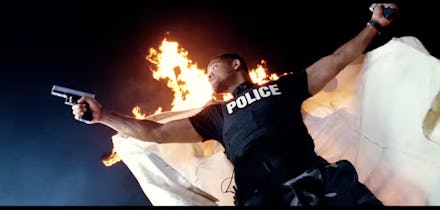One of the Biggest Issues From Ferguson Might Be the Easiest to Solve

Of the many issues that surfaced after the shooting of Michael Brown, the militarization of local police forces might be the easiest to solve. It's a reality at least partially related to the depiction of the police in pop culture.
In a revealing piece for Gawker, writer Adam Weinstein explores the highly-advanced military equipment used on protesters, aptly describing the Ferguson police as "acting like extras in a Michael Bay movie playing soldier." His word choice, "playing soldier," references Bay's penchant for mindless action slog as well as the police forces' seeming passion for mimicry. The conduct of militarized cops is, in part, an attempt to play a role, a reflection of law enforcement in pop culture — a system that prizes those cops who go rogue and risk it all to do what they think is right. The harmful nature of that ideal, and what happened in Ferguson, is a conversation we need to be having, even as Ferguson and its aftermath fade from the news cycle.
In some of the videos of police misconduct, the officers really do sound like they're spewing poorly written dialogue from Bad Boys 2 ("I will fucking kill you" springs to mind). Then, of course, there's the basic fact of tear gas, sound guns and assault rifles all trained on protestors in residential neighborhoods instead of Godzilla or General Zod. These incidents might be isolated, but taken together with the rest of the Ferguson police's conduct throughout the protests, they help connect a few dots. Perhaps most telling: Officers in a suburban environment, theoretically charged with simply controlling a crowd and maintaining order, wore camouflage gear better suited to desert warfare. This isn't just a question of having better equipment — it's a performance that attempts to emulate the onscreen performances of cops and soldiers. Those are characters that have no business in the real world ("hero cops"), or at least no business in Missouri (soldiers).
Police have been pop culture heroes for years. This makes sense. They're imbued with the responsibility of maintaining law and order while warding off threats to society. It's not particularly surprising that the police procedural is still by far the most common form of popular television drama (if you don't believe me, NCIS is still the most popular show on television). That trend stretches back years, even to series that don't feature cops in the standard sense. Something like The A-Team is still, at its root, a series about law enforcement, even if that law is something closer to a common-sense morality. Our popular media has long valorized agents of the state.
This isn't to say that there's a direct causal link between movies about militarized police and the conduct of officers in Ferguson (or the broader militarization of police as an American policy matter). But that doesn't mean that our cinematic and televised squad houses and barracks aren't important. They're reflective of the way we see law enforcement and the way we envision how we handle threats, and they create role models for tense, high-pressure situations for which local officers are generally untrained and under-equipped to handle — like, say, mass protests. Our pop culture law enforcement exemplars go "above and beyond," the reckless cops on the edge who break the rules for the greater good and beat the bad guy. They're almost always right, our Dirty Harrys and John McClanes, our Rust Cohles and even our Elliot Stablers. (We don't call superheroes vigilantes for nothing). These characters are the ones who are "a little bit hard," and bottom line they're just cooler — who wants to watch a cop who's really good at paperwork?
There are quite a few (though not enough) depictions of cops acting badly, but this very particular aspiration — police officers wanting to be armed badasses, or thinking of themselves as soldiers in a "drug war" — is only rarely satirized. The best recent example isn't even American; it's Nick Frost's Danny Butterman from 2007's Hot Fuzz. Butterman is obsessed with action movies, and is shocked when actual hero cop Nicholas Angel (Simon Pegg) has practically no knowledge of them ("You ain't seen Bad Boys II?"). The thrilling, guns-blazing conclusion of the movie is great for many reasons, among them the way Angel and Butterman mimic many of the scenes from their favorite movies, but it's also not so hard to imagine the shootout with less worthy targets.
To some extent, this isn't a policy issue. Raising the specter of militarized police in pop culture is, at best, a call for creators and viewers alike to be a little more thoughtful about who they emulate. But there is a minor policy element, and it leads back to the same source. Our increasingly positive portrayals of the military and of militaristic action are no accident: The Pentagon has a history of influencing scripts in exchange for access.
Powerful organizations manipulating coverage for "access" is certainly not unique to the military, and it's true that, in part, the military is primarily lobbying for accuracy in how they are depicted. But there's a gap between what pop culture depicts and how it depicts it, and if we expect to uproot police militarization, we might take stock of attitudes as much as equipment.